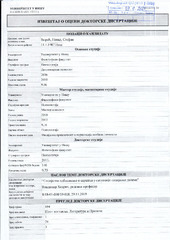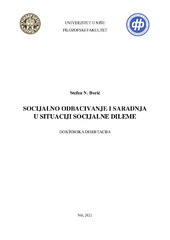Приказ основних података о дисертацији
Socijalno odbacivanje i saradnja u situaciji socijalne dileme
| dc.contributor.advisor | Hedrih, Vladimir | |
| dc.contributor.other | Popadić, Dragan | |
| dc.contributor.other | Pejčić, Marija | |
| dc.creator | Đorić, Stefan | |
| dc.date.accessioned | 2022-12-05T13:22:51Z | |
| dc.date.available | 2022-12-05T13:22:51Z | |
| dc.date.issued | 2022-02-21 | |
| dc.identifier.uri | http://eteze.ni.ac.rs/application/showtheses?thesesId=8539 | |
| dc.identifier.uri | https://fedorani.ni.ac.rs/fedora/get/o:1807/bdef:Content/download | |
| dc.identifier.uri | https://plus.cobiss.net/cobiss/sr/sr/bib/59588105 | |
| dc.identifier.uri | https://nardus.mpn.gov.rs/handle/123456789/21033 | |
| dc.description.abstract | Social exclusion represents an unpleasant experience that results in changes in thinking, emotions, motives and behavior. An attempt to predict a person's behavior after being exposed to social exclusion is an important question, which is accompanied by paradoxical answers. An excluded person may tend to harm others (antisocial reaction), to treat them with increased ingratiation (prosocial reaction), or may withdraw from further social contacts. A specific context in which the effect of social exclusion can be manifested is cooperation in a mixed-motive situation. The aim of this research was to test the hypotheses about the prosocial and antisocial reaction in the Trust game, specifically, to examine whether social exclusion results in reduced or increased cooperation. In order to provide a nuanced perspective, and thus potentially help to overcome existing contradictions in the literature, the moderating effect of partner’s reputation and trustworthiness were also examined. At the same time, individual differences were taken into consideration, more precisely, Social - Value Orientation and Rejection Sensitivity. Randomized experimental design without pretest was applied, with three between-subject situational factors Social exclusion (excluded / included / neutral) x Reputation (known / unknown partner) x trustworthiness (trustworthy /untrostworthy), and two covariates related to individual differences (Social value orientation and Rejection sensitivity). While checking the effects of situational variables was performed by exposing participants to different conditions, Social - Value Orientation and Rejection sensitivity were operationalized with the Slider Technique and the Rejection sensitivity scale (RSQ). The sample included 175 participants, students of the first and second year of Psychology at the Faculty of Philosophy in Nis. Despite the successful manipulation of social exclusion, the results do not support previous studies showing that exclusion has an effect on cooperation in the social dilemma. The main effects were observed only when it comes to variables reputation and trustworthiness. Based on the observed results, It can be assumed that the experience of social exclusion was a negative one, a kind of warning to participants that made them cautious, but no less willing to analyze social signs and decide to cooperate in the Trust Game. | en |
| dc.format | application/pdf | |
| dc.language | sr | |
| dc.publisher | Универзитет у Нишу, Филозофски факултет | sr |
| dc.rights | openAccess | en |
| dc.rights.uri | https://creativecommons.org/licenses/by-nc-nd/4.0/ | |
| dc.source | Универзитет у Нишу | sr |
| dc.subject | socijalno odbacivanje | sr |
| dc.subject | social rejection | en |
| dc.subject | socijalno isključivanje | sr |
| dc.subject | ostrakizam | sr |
| dc.subject | saradnja | sr |
| dc.subject | socijalna dilema | sr |
| dc.subject | social exclusion | en |
| dc.subject | ostracism | en |
| dc.subject | cooperation | en |
| dc.subject | social dilemma | en |
| dc.title | Socijalno odbacivanje i saradnja u situaciji socijalne dileme | sr |
| dc.type | doctoralThesis | |
| dc.rights.license | BY-NC-ND | |
| dc.identifier.fulltext | http://nardus.mpn.gov.rs/bitstream/id/148442/Doctoral_thesis_12936.pdf | |
| dc.identifier.fulltext | http://nardus.mpn.gov.rs/bitstream/id/148441/Djoric_Stefan_N.pdf | |
| dc.identifier.rcub | https://hdl.handle.net/21.15107/rcub_nardus_21033 |



